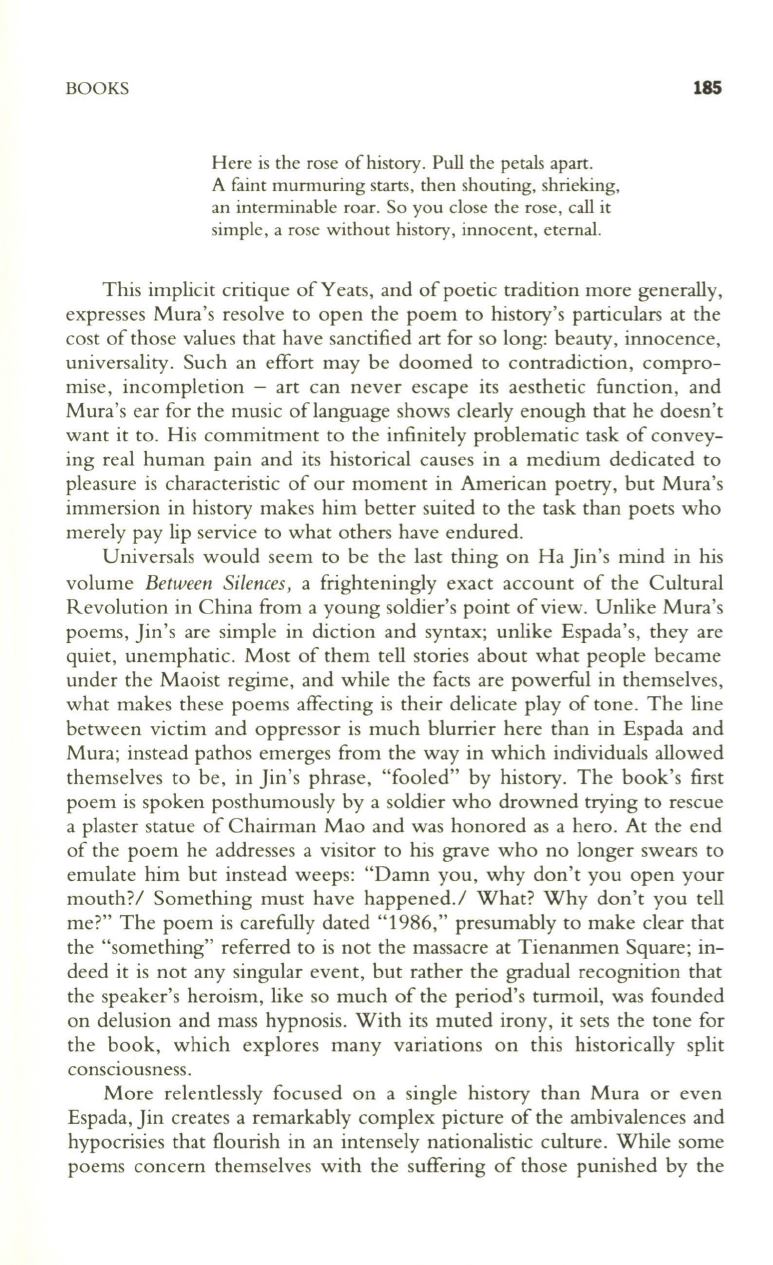
BOOKS
Here is the rose ofhistory. Pull the petals apart.
A
faint murmuring starts, then shouting, shrieking,
an interminable roar. So you close the rose, call it
simple, a rose without history, innocent, eternal.
185
This implicit critique of Yeats, and of poetic tradition more generally,
expresses Mura's resolve to open the poem to history's particulars at the
cost of those values that have sanctified art for so long: beauty, innocence,
universality. Such an effort may be doomed to contradiction, compro–
mise, incompletion - art can never escape its aesthetic function, and
Mura's ear for the music of language shows clearly enough that he doesn't
want it to. His commitment to the infinitely problematic task of convey–
ing real human pain and its historical causes in a medium dedicated to
pleasure is characteristic of our moment in American poetry, but Mura's
immersion in history makes him better suited to the task than poets who
merely pay lip service to what others have endured.
Universals would seem to be the last thing on Ha Jin's mind in his
volume
Between Silences,
a frighteningly exact account of the Cultural
Revolution in China from a young soldier's point of view. Unlike Mura's
poems, Jin's are simple in diction and syntax; unlike Espada's, they are
quiet, unemphatic. Most of them tell stories about what people became
under the Maoist regime, and while the facts are powerful in themselves,
what makes these poems affecting is their delicate play of tone. The line
between victim and oppressor is much blurrier here than in Espada and
Mura; instead pathos emerges from the way in which individuals allowed
themselves to be, in Jin's phrase, "fooled" by history. The book's first
poem is spoken posthumously by a soldier who drowned trying to rescue
a plaster statue of Chairman Mao and was honored as a hero. At the end
of the poem he addresses a visitor to his grave who no longer swears to
emulate him but instead weeps: "Damn you, why don't you open your
mouth?
I
Something must have happened./ What? Why don't you tell
me?" The poem is carefully dated "1986," presumably to make clear that
the "something" referred to is not the massacre at Tienanmen Square; in–
deed it is not any singular event, but rather the gradual recognition that
the speaker's heroism, like so much of the period's turmoil, was founded
on delusion and mass hypnosis. With its muted irony, it sets the tone for
the book, which explores many variations on this historically split
consciousness.
More relentlessly focused on a single history than Mura or even
Espada, Jin creates a remarkably complex picture of the ambivalences and
hypocrisies that flourish in an intensely nationalistic culture. While some
poems concern themselves with the suffering of those punished by the


